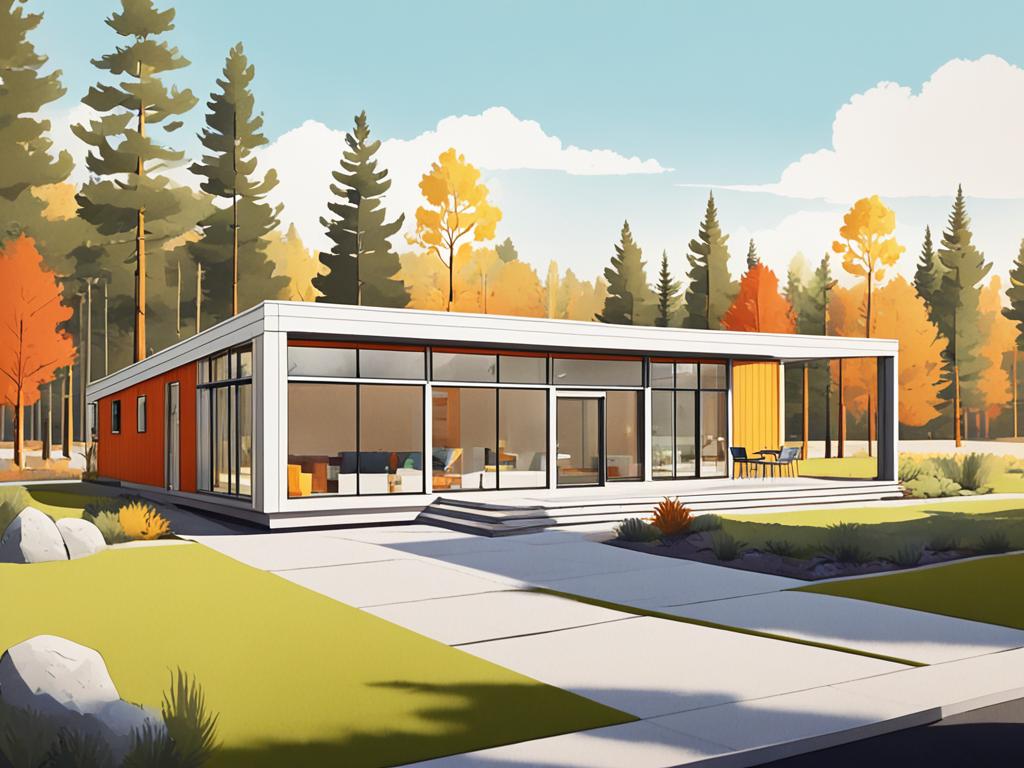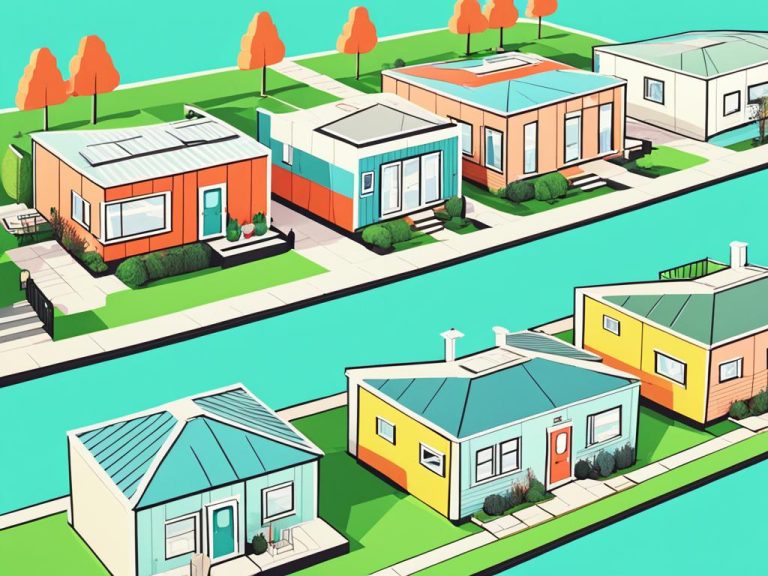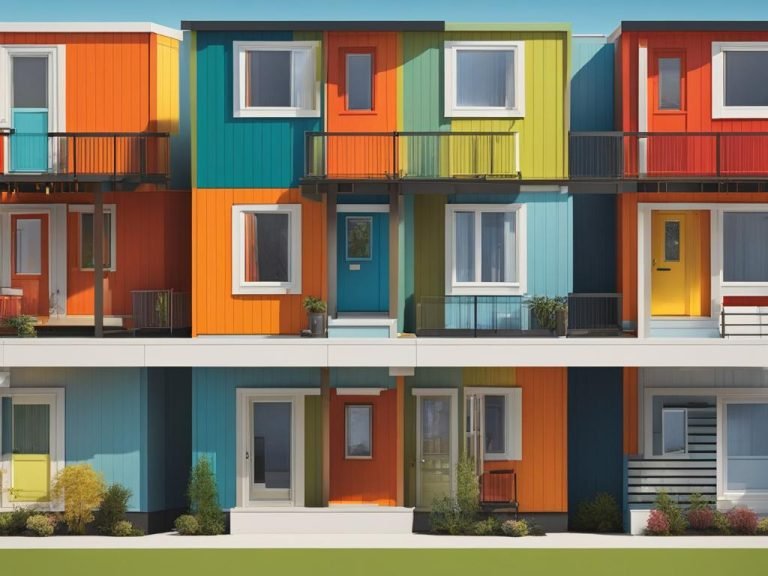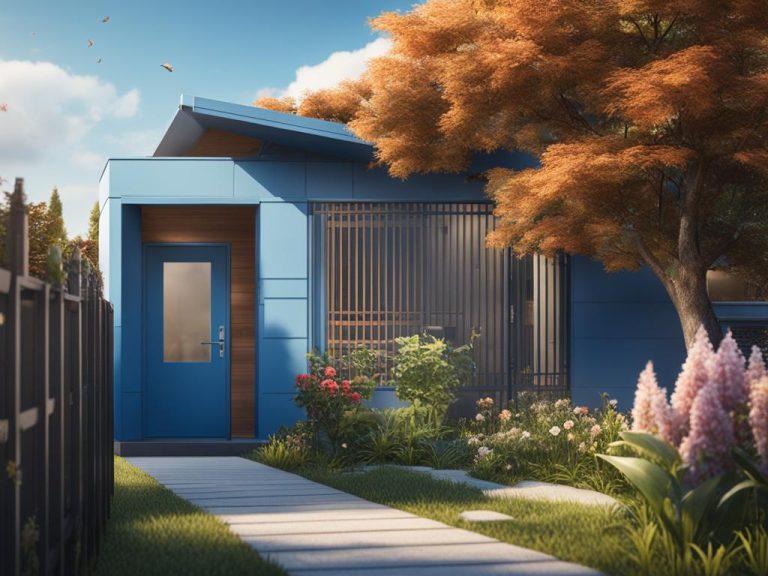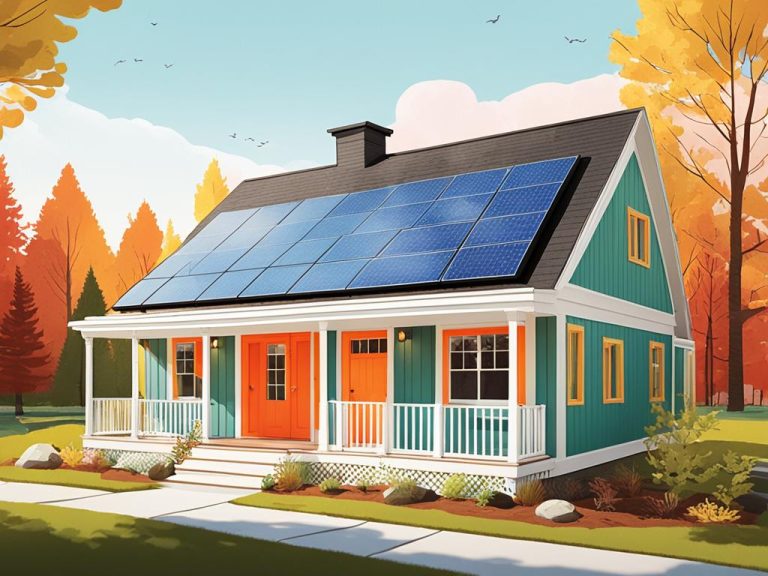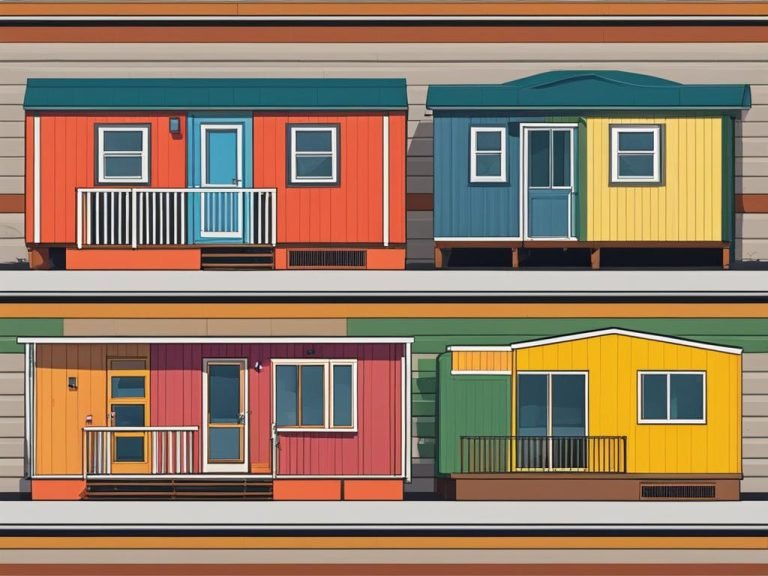Modular vs Mobile Home: A Comparison
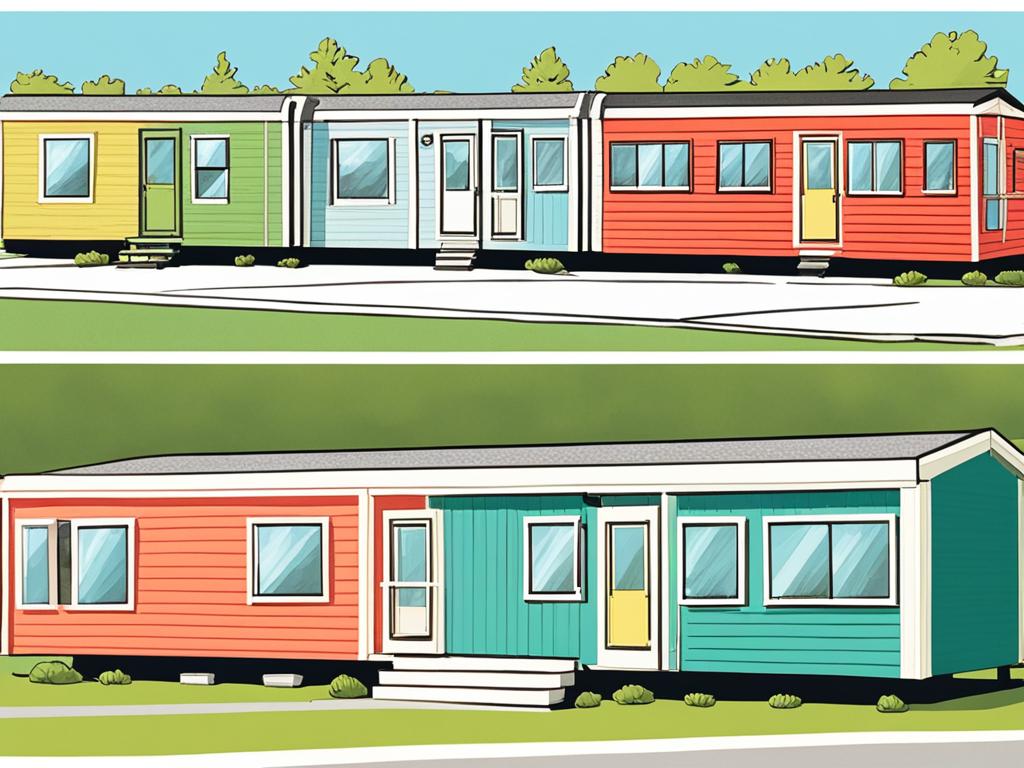
When comparing modular and mobile homes, it’s important to understand the key differences between these types of prefabricated homes. Modular homes are constructed off-site and built to local building codes, while mobile homes are built to a federal code set by the Department of Housing and Urban Development (HUD). The construction standards, design, and flexibility of these homes vary, and each has its own advantages and considerations.
Key Takeaways
- Modular homes are constructed off-site and adhere to local building codes.
- Mobile homes are built to a federal code set by HUD.
- Modular homes offer more design options and customization.
- Mobile homes are often more affordable and have shorter construction times.
- The financing options for modular and manufactured homes differ.
What is a Modular Home?
A modular home is a prefabricated structure that is partially constructed in a factory and then transported to the homeowner’s lot. These homes are built to local building codes and placed on a permanent foundation. Modular homes come in a variety of designs and sizes, and they can be customized to fit the homeowner’s preferences. They offer the advantage of shorter construction time and reduced waste compared to traditional site-built homes.
Unlike mobile homes, which are built to a federal code set by the Department of Housing and Urban Development (HUD), modular homes adhere to the local building codes specific to the region where they will be located. This ensures that the construction meets the quality and safety standards required by the local authorities.
Modular homes are constructed off-site in a controlled environment, allowing for greater precision and efficiency. This off-site construction method also reduces the amount of waste typically associated with traditional on-site home construction.
Once the modular home is completed in the factory, it is transported to the homeowner’s lot and placed on a permanent foundation. This foundation provides stability and permanence to the structure, making a modular home a long-term housing solution.
With modular homes, homeowners have the flexibility to choose from a range of designs and sizes. Whether they prefer a traditional or modern style, there is a wide variety of options available to suit their preferences. Additionally, modular homes can be customized with various features and finishes to create a personalized living space.
The advantages of modular homes, such as shorter construction time, reduced waste, adherence to local building codes, and customization options, make them an increasingly popular choice for homeowners seeking a cost-effective and sustainable housing solution.
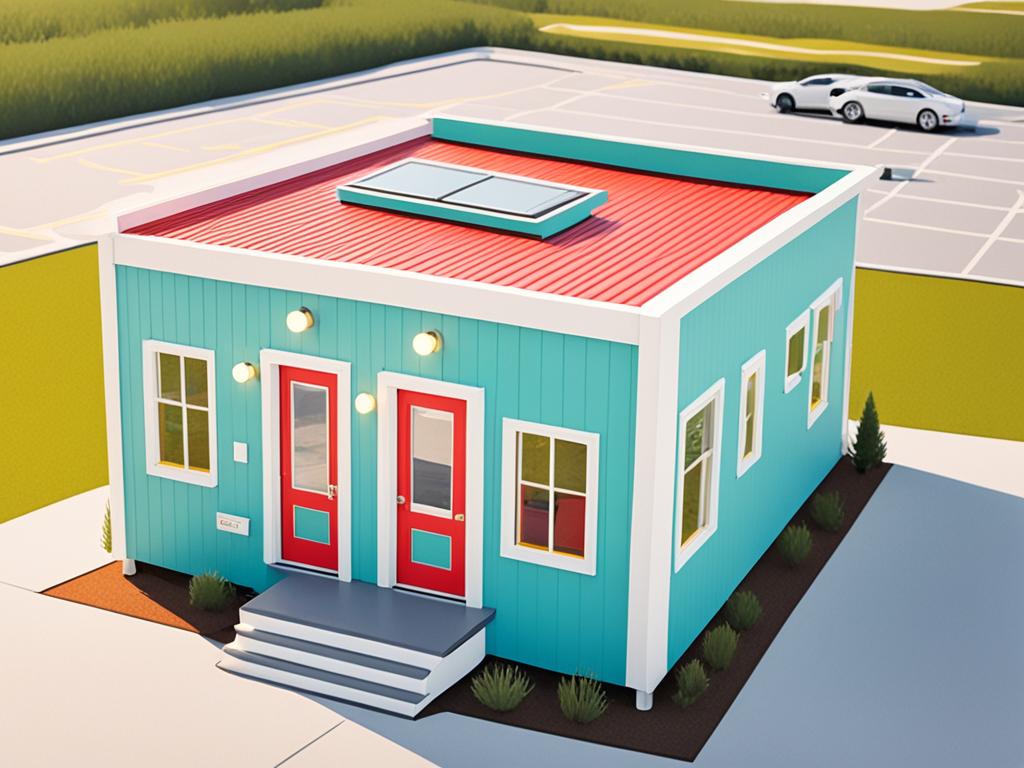
What is a Manufactured Home?
A manufactured home, also known as a mobile home, is a prefabricated structure that is built in a factory and transported to a site in one piece. These homes are constructed according to a federal code set by HUD and can be placed on either a temporary or permanent foundation. While manufactured homes used to be associated with temporary or trailer-like structures, modern manufactured homes can have many of the characteristics of traditional homes, including customizable floor plans and architectural styles.
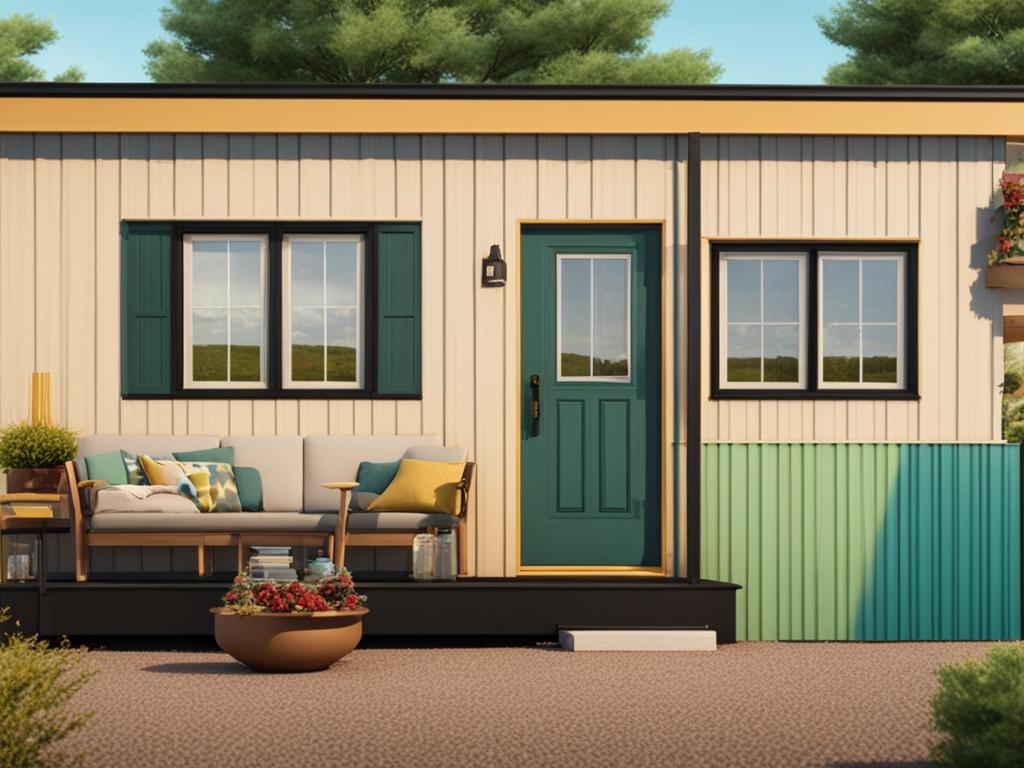
Manufactured homes, or mobile homes as they are commonly referred to, are factory-built structures that offer a convenient and affordable housing solution. These homes are constructed according to a strict federal code set by the Department of Housing and Urban Development (HUD), ensuring quality and safety standards are met.
Unlike modular homes, which are partially built off-site and transported to the homeowner’s lot, manufactured homes are constructed entirely in a factory and then transported to the desired location in one piece. This allows for a quicker construction process and reduces the overall cost compared to traditional site-built homes.
Despite their association with temporary or trailer-like structures in the past, modern manufactured homes have evolved to offer a range of amenities and design options. Homebuyers can choose from a variety of customizable floor plans and architectural styles to suit their preferences and needs.
Manufactured homes can be placed on either a temporary or permanent foundation, depending on the homeowner’s preferences and local regulations. Temporary foundations, such as piers or blocks, allow for mobility and the ability to relocate the home if desired. Permanent foundations, on the other hand, provide stability and can increase the home’s value over time.
It’s worth noting that while manufactured homes offer affordability and flexibility, they must still comply with stringent federal regulations. This ensures that the homes are built to withstand transportation and meet safety standards, making them a reliable housing option for many individuals and families.
Key Differences Between Modular and Manufactured Homes
When comparing modular homes to manufactured homes, it becomes evident that there are key distinctions in construction standards and financing options. Modular homes are constructed in compliance with local building codes, ensuring they meet the same standards as traditional site-built homes. This allows modular homes to be financed through a regular mortgage, providing homeowners with a familiar financing option.
On the other hand, manufactured homes are built to a federal code set by the Department of Housing and Urban Development (HUD). While this code ensures construction quality, it can limit financing options. Homeowners seeking to finance a manufactured home may need to consider personal loans as a viable option.
Another important difference lies in the classification of the homes. Modular homes are typically considered real property, much like traditional houses, which can impact their equity and potential appreciation. In contrast, manufactured homes are often categorized as personal property, which can have implications for financing and overall value.
These differences in construction standards and financing options make it important for prospective homeowners to carefully consider their choices and understand the long-term implications. Investing in a modular home offers the advantage of adhering to local codes and securing traditional mortgage financing. However, those looking for a manufactured home may need to explore alternative financing options, such as personal loans.
Ultimately, understanding the distinctions between modular and manufactured homes will help homeowners make an informed decision that aligns with their specific needs and preferences.
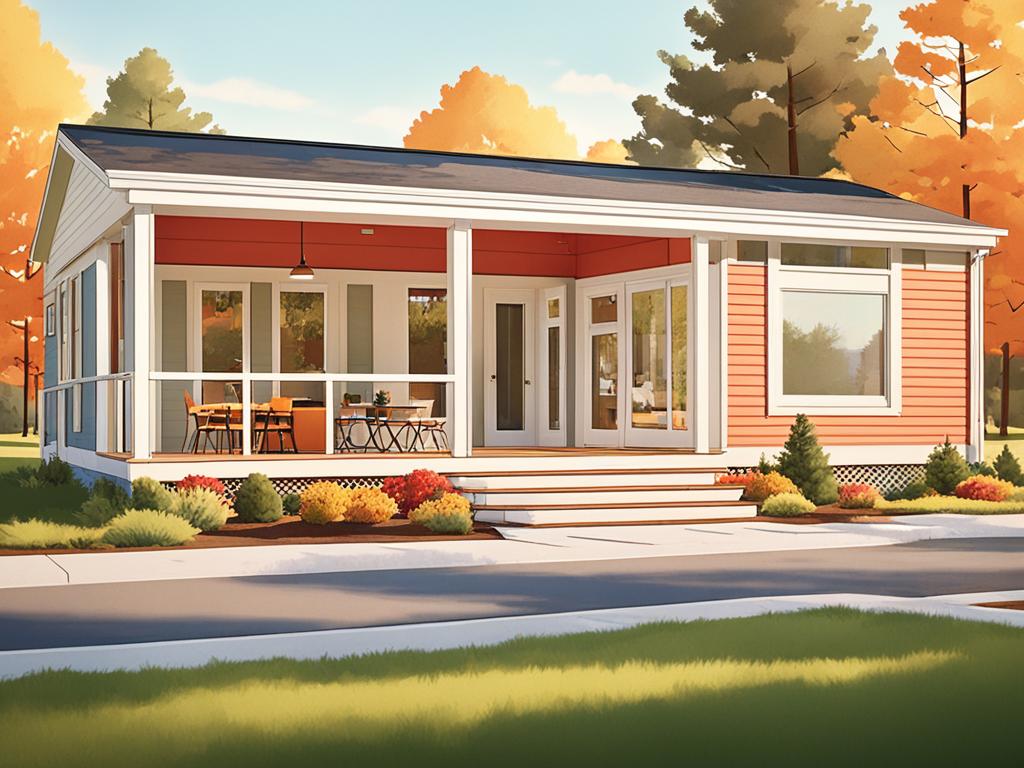
Considerations for Choosing Between Modular and Manufactured Homes
When deciding between a modular home and a manufactured home, there are several factors to consider. Both options offer unique benefits and considerations, so it’s important to evaluate your needs and priorities.
Customization
Modular homes provide more customization options compared to manufactured homes. With modular construction, you can tailor the design and features of your home to suit your preferences. Whether you want an open floor plan, specific finishes, or additional rooms, modular homes can be customized to reflect your unique style and needs.
On the other hand, manufactured homes may have limitations in terms of customization. They typically come in pre-designed layouts and may have fewer options for personalization. However, some manufacturers offer a range of floor plans and customization choices, allowing you to select certain features that align with your preferences.
Maintenance
When it comes to maintenance, modular homes often require less upkeep compared to manufactured homes. Modular homes are built with durable materials and follow local building codes, which can contribute to their longevity and reduced maintenance needs. Regular inspections and basic maintenance can help keep your modular home in excellent condition for years to come.
Manufactured homes, while still built to standards set by the Department of Housing and Urban Development, may require more maintenance due to the nature of their construction and materials. It’s important to keep up with maintenance tasks such as inspecting the roof, checking the undercarriage, and addressing any necessary repairs or updates.
Zoning Laws
Modular homes are subject to the same zoning laws as traditional site-built homes. This means that they can be placed on residential lots in areas where traditional homes are permitted. Zoning laws vary by location, so it’s crucial to check the regulations specific to your desired placement area.
Manufactured homes, on the other hand, may have restrictions on placement due to zoning laws and regulations that apply specifically to mobile home parks or designated manufactured home communities. It’s important to consider these restrictions and ensure you have a suitable location before purchasing a manufactured home.
One advantage of manufactured homes is their affordability. They generally have a lower upfront cost compared to modular homes, making them a more budget-friendly option for many home buyers. Additionally, manufactured homes offer the flexibility of being able to be moved to different locations if desired.
Modular homes, while typically more expensive upfront, can offer greater long-term value and appreciation. They are considered permanent structures and may appreciate in value similarly to traditional homes. They also tend to have a faster construction time compared to site-built homes, allowing you to move into your new home more quickly.
Ultimately, the decision between a modular home and a manufactured home depends on your unique needs, preferences, and budget. Consider factors such as customization options, maintenance requirements, zoning laws, and overall cost to make an informed decision that aligns with your goals and lifestyle.
Financing Options for Modular and Manufactured Homes
Financing options for modular and manufactured homes can vary depending on their classification and status. If you’re considering purchasing a modular home, you may be able to secure financing through a construction loan, similar to traditional site-built homes. This type of loan allows you to borrow the funds needed to build the modular home, and it can be repaid over time with regular mortgage payments. It’s important to consult with a reputable lender who specializes in modular home financing to explore your options.
On the other hand, if you’re interested in buying a manufactured home, the financing process may be slightly different. Manufactured homes are often considered personal property rather than real property, which means they may require a personal loan for financing. Personal loans are typically unsecured loans that can be used for various purposes, including purchasing a manufactured home. However, keep in mind that the interest rates and terms for personal loans may vary depending on your credit score and financial history.
It’s worth noting that there are some government-backed loan programs available for financing manufactured homes built after a specific date. For example, the Federal Housing Administration (FHA) offers loans specifically for manufactured homes, and the Department of Veterans Affairs (VA) provides financing options for eligible veterans and active-duty military personnel. These programs can offer more favorable loan terms, such as lower down payment requirements and relaxed credit score criteria.
Before making a decision, it’s crucial to carefully consider the financing options and requirements for each type of home. Take the time to research and compare interest rates, loan terms, and lender reputations. By doing so, you can ensure that you make an informed decision that aligns with your financial goals and circumstances.

Conclusion
When comparing modular and mobile homes, it becomes clear that both options have their own set of pros and cons. Modular homes offer the advantage of customization, allowing homeowners to personalize their living spaces to suit their preferences. With adherence to local building codes, these homes provide a sense of security and structural integrity. Additionally, modular homes have the potential for higher appreciation over time, making them a sound investment choice.
On the other hand, manufactured homes are known for their affordability and shorter construction times. They offer a quicker path to homeownership and can be a great option for those on a tight budget. Moreover, manufactured homes provide the flexibility of being able to move if desired, offering the opportunity to explore different locations while maintaining the comforts of home.
In conclusion, the decision between modular and manufactured homes ultimately comes down to the homeowner’s priorities, budget, and long-term plans. Those looking for customization, adherence to building codes, and potential appreciation may lean towards modular homes. Alternatively, individuals seeking affordability, shorter construction times, and mobility may find manufactured homes to be the better fit. It is crucial to carefully consider all factors and weigh the pros and cons before finalizing a decision on which type of prefabricated home is most suitable.
FAQ
What is the difference between a modular home and a mobile home?
Modular homes are constructed off-site and built to local building codes, while mobile homes are built to a federal code set by the Department of Housing and Urban Development (HUD).
What is a modular home?
A modular home is a prefabricated structure that is partially constructed in a factory and then transported to the homeowner’s lot. These homes are built to local building codes and placed on a permanent foundation.
What is a manufactured home?
A manufactured home, also known as a mobile home, is a prefabricated structure that is built in a factory and transported to a site in one piece. These homes are constructed according to a federal code set by HUD and can be placed on either a temporary or permanent foundation.
What are the key differences between modular and manufactured homes?
The key differences lie in their construction standards and financing options. Modular homes are built to local building codes and can be financed through a regular mortgage, similar to traditional site-built homes. Manufactured homes are built to a federal code and may require a personal loan for financing.
What considerations should I take into account when choosing between a modular and manufactured home?
When deciding between the two, consider factors such as customization options, maintenance requirements, and adherence to zoning laws. Modular homes offer more customization options and tend to require less maintenance. Manufactured homes are more affordable, have shorter construction times, and can be moved to different locations if desired.
What financing options are available for modular and manufactured homes?
Modular homes can be financed through a construction loan, similar to traditional site-built homes. Manufactured homes, on the other hand, may require a personal loan for financing. However, there are FHA loans and VA loans available for financing manufactured homes built after a specific date.

